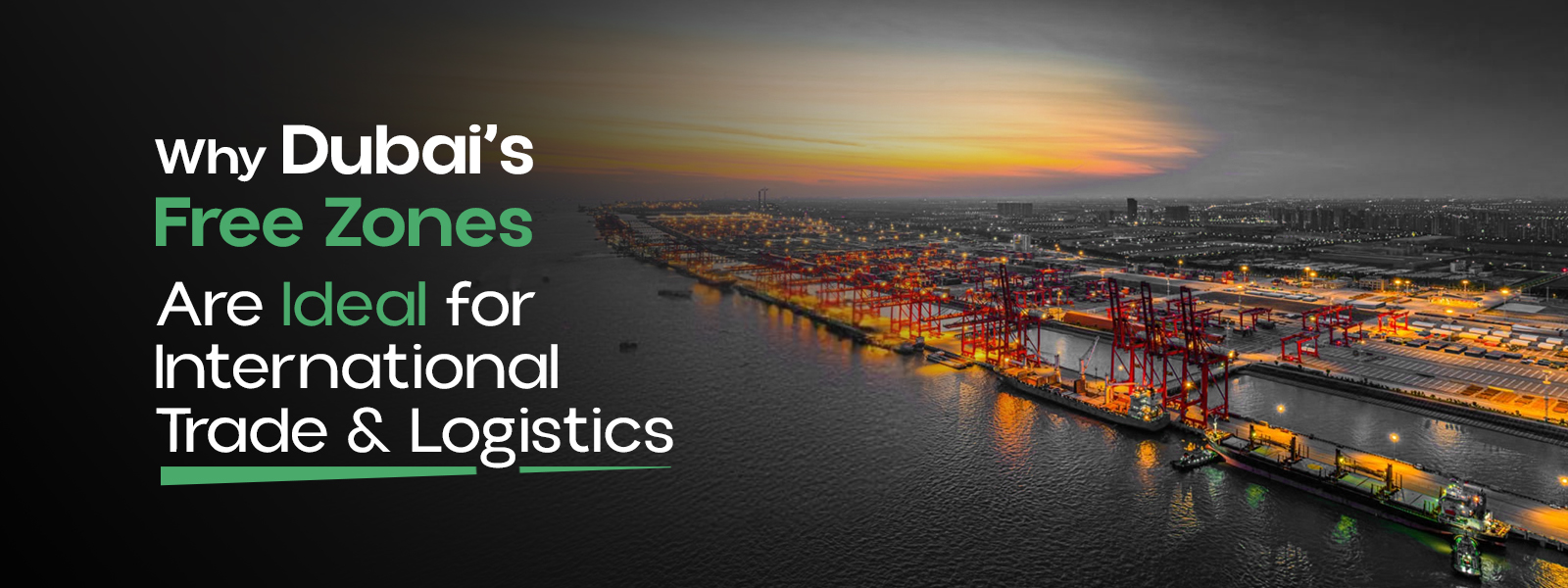Dubai has firmly established itself as a global hub for international trade and logistics, boasting over 60 free zones that cater to diverse economic sectors, including transport, healthcare, media, and technology. These zones are designed to attract entrepreneurs worldwide, providing them with world-class infrastructure, zero taxes, and the advantage of 100% foreign ownership. New company registrations in these zones surged by 25% in the first half of 2023, with an impressive 90% of businesses thriving and reporting faster growth than those in traditional areas. So, what’s the secret behind this success?
This blog will help you understand the perks of Dubai’s free zones, from tax incentives to streamlined business setups, and how they can help your business take off in 2024.
What Is a Free Zone?
A free zone is a designated area within a country that offers unique economic regulations to attract foreign investment. In Dubai, these zones are strategically designed to allow businesses to operate with benefits that significantly differ from those applicable outside the zone. This includes exemptions from corporate taxes and customs duties, along with the ability for foreign investors to maintain complete ownership of their enterprises. Establishing free zones in Dubai is part of a broader strategy to diversify the UAE’s economy and enhance its appeal as a global business destination, making your potential investments significant.
Free Zones in Dubai
Dubai boasts several free zones, each catering to different industries and business needs. Some of the most notable free zones in Dubai include:
- Jebel Ali Free Zone (JAFZA): The first free zone established in the UAE focuses on logistics and trade.
- Dubai Multi Commodities Centre (DMCC): UAE’s premier hub for commodities and the only jurisdiction authorized for crypto trading. It provides top-tier support for blockchain and cryptocurrency businesses.
- Dubai Internet City (DIC): Aimed at technology firms, this zone promotes innovation and digital entrepreneurship.
- Dubai Healthcare City: Focused on healthcare-related businesses, this zone supports medical services and research.
These zones attract businesses and foster a collaborative ecosystem where companies can thrive on their brand and make a notable business identity.
Geographic Distribution of Free Zones across the UAE
While Dubai is home to many prominent free zones, other emirates also have their own. For example:
- Abu Dhabi: Home to zones like the Abu Dhabi Global Market (ADGM), focusing on financial services.
- Sharjah: Features Sharjah Airport International Free Zone (SAIF-Zone), catering to various industries.
- Ajman: Offers Ajman Free Zone, known for its competitive pricing and ease of setup.
This geographic diversity allows businesses to choose locations that best suit their operational needs while gaining unique advantages from each zone.
What Makes UAE Free Zones Stand Out?
The UAE’s free zones stand out due to several key notable factors that can’t be ignored easily. These benefits offer lucrative businesses opportunities in various sectors, including healthcare, trading, tech, and more.
- 100% Foreign Ownership: Unlike mainland companies that require a local partner, free zones allow complete foreign ownership.
- No Corporate Tax: Many free zones offer zero corporate tax rates for a specified period, significantly reducing operational costs.
- Streamlined Customs Procedures: Businesses enjoy exemptions from import/export duties, facilitating smoother international trade.
- World-Class Infrastructure: The UAE provides state-of-the-art facilities, including modern office spaces and logistics hubs.
Benefits of Dubai Free Zones
Dubai Free Zones are the land of business opportunities. It comes with numerous benefits, including:
- 100% Repatriation of Profits: Investors can transfer all profits back to their home countries without restrictions.
- Flexible Licensing Options: Various licenses cater to business activities, from trading to manufacturing.
- Quick Setup Process: The streamlined procedures allow businesses to get started quickly with minimal bureaucracy.
- Networking Opportunities: Proximity to like-minded businesses fosters collaboration and growth opportunities.
Industry-Specific Dubai Free Zones
Despite 30+ free zones, Dubai’s free zones cater to specific industries, enhancing their appeal:
- Technology: Dubai Internet City supports IT firms with tailored infrastructure.
- Healthcare: Dubai Healthcare City offers specialized facilities for medical services and research.
- Media: Dubai Media City provides resources for media companies, including studios and office spaces.
This specialization allows businesses to benefit from industry-specific resources and networks.
Types of Business Licenses Available in Dubai Free Zones
If you are considering establishing a business in Dubai’s free zones, choose from various licenses based on your planned business activities. Mainly, here are three license options businesses can choose from:
- Commercial License: For trading activities within and outside the UAE.
- Industrial License: Required for manufacturing or assembling products.
- Professional License: For service-oriented businesses such as consulting or legal services.
Each license type has specific requirements and benefits tailored to the nature of the business activity. Hence, it’s better to research your business activity and the license that best suits your business goal and then apply for the relevant one.
What Kinds of Legal Entities Can Be Established in a Dubai Free Zone?
In Dubai’s free zones, two primary types of legal entities can be established:
- Free Zone Company (FZCO): FZCO shares similar attributes to an FZ LLC. It is suitable for companies with multiple shareholders and offers flexibility in ownership structure. It facilitates diversified business investments and collaboration expansion strategies.
- Free Zone Establishment (FZE): This structure is designed for investors who want a simplified company structure with a single shareholder. The shareholder can be an individual or corporate entity. Sole proprietors and entrepreneurs who want to maintain direct control over their business operations opt for the FZE structure.
These structures allow businesses to operate efficiently while enjoying the benefits of the free zone environment.
Business Setup Procedure in Dubai Free Zone
Setting up a business in a Dubai-free zone involves several straightforward steps:
- Determine your Business Activity: Identify your business type, and obtain the required licenses.
- Choose a Trading Name: Ensure it complies with UAE naming conventions.
- Apply for a Business License: Submit the necessary documents and your application.
- Select Office Space: Options range from flexi-desks to complete office setups.
- Obtain Approvals and Register Your Business: Complete all the required registrations with the relevant authority.
The process is designed to be efficient, allowing entrepreneurs to quickly navigate the setup process and focus on their core business activities.
In conclusion, Dubai’s free zones offer an unparalleled international trade and logistics environment. Their strategic advantages, diverse industry focus, and supportive infrastructure make them an attractive option for businesses looking to establish or expand their operations in the UAE.






















